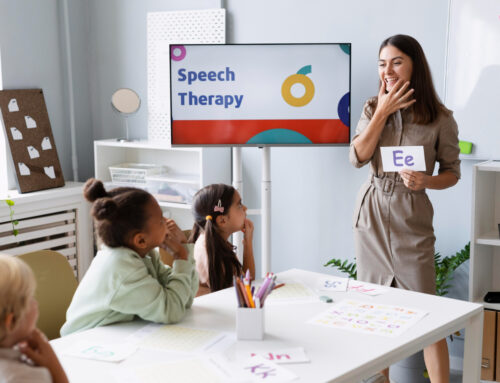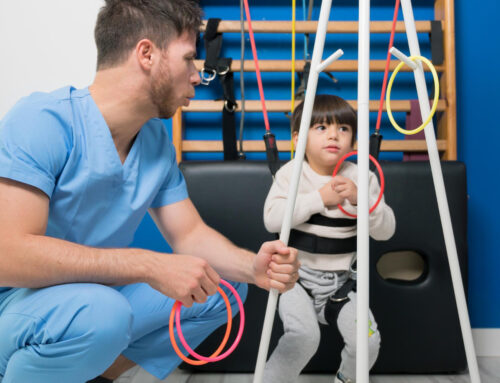There’s hardly anything more gratifying for a parent than hearing their youngster utter their first words or observing them taking their inaugural steps. But when there are problems with spoken language or understanding, it can be frustrating for both the child & the parent.
Some parents avoid addressing the issue, expecting their child to eventually catch up. However, if a language disorder continues into the school-age years, it might spark social & academic problems.
Creating language-rich environments can help foster the growth of speech & language skills in young children. However, even with a supportive home environment, some children may develop communication skills at a different pace than their peers.
Note:- The ASHA reports that nearly 8% of children in the United States struggle with language delays or disorders. Boys are particularly susceptible, almost twice as likely as girls, to have a communication disorder. The 3–6 age range sees the highest concentration of these disorders, so it is crucial to address them early on.
This article will explain one of the significant types of language disorders, i.e., Expressive Language Disorder. We will provide the detailed information you need to understand about Expressive Language Disorder for your child’s language development.
If you have any questions or want to learn more, we will provide you with a free phone consultation with our lead speech pathologist! Keep reading & Stay tuned!
What Is Expressive Language Disorder?

Expressive Language Disorder is a problem with communication. Those suffering from it have trouble sharing their thoughts or ideas or demonstrating that they understand what others say. This occurs in all settings – at school, work & anywhere else people interact.
Expressive Language Disorder can make it difficult to form sentences that others will understand. This may limit their time to answer questions or take turns in a conversation, which can hinder making friends & developing relationships.
Expressive Language Disorder is one of three disorders that make it hard to use & understand language.
- Expressive Language Disorder
- Receptive Language Disorder
- Mixed Receptive-Expressive Language Disorder
People with Expressive Language Disorder often also have a receptive language disorder, making it challenging to comprehend speech.
If you think your child may have an Expressive Language Disorder or receptive language disorder, it’s essential to get them assessed by a professional. Other disorders can also affect communication, so it’s best to be safe rather than sorry!
Warning Signs & Symptoms That Your Child May Have An Expressive Language Disorder

Children learn to communicate from birth. As they grow, their ability to express themselves through language & understand the spoken messages of others improves. Though it may be worrisome if your toddler isn’t talking as much as their peers, don’t fret just yet. It’s common for some children to reach expressive language milestones a little later than others.
However, if your child continues to have difficulty expressing themselves, they will likely be diagnosed with an expressive language disorder. This disorder can lead to social problems at school, a higher chance of developing learning difficulties & low self-esteem.
Signs & Symptoms
Explicit Signs & Symptoms
Some tell-tale symptoms of expressive language disorder are trouble speaking & expressing oneself to others.
1. difficulty in coming up with the perfect term & using spacers like “um.”
2. uses the incorrect verb tense & wrong pronouns (such as him/he, her/she, them/they)
3. forgets pronouns or verbs
4. bumbles over words
5. difficulty asking & answering questions
6. repeats words back when asked a query
7. struggles learning songs or rhymes
8. difficulty expressing thoughts & ideas
9. uses noticeably fewer words & sentences than kids of a similar age
10. uses shorter sentence construction than kids of a similar age
11. has a little & more basic vocabulary than children of a similar age
12. uses the wrong words in sentences which twists the meaning of sentences
13. relies on standard phrases & little content in speech
14. pauses & hesitates when attempting to converse
15. talks “in circles.”
16. fails to observe general rules of communicating with others
17. has difficulty with oral & written school assignments
18. uses vague words like “thing” or “stuff.”
19. uses vocabulary incorrectly
20. speaks quietly
21. exhibits selective mutism
22. demonstrates incorrect usage of grammar
Subtle Signs & Symptoms
- Sequencing
Children with expressive language disorder often have difficulty putting language together logically, such as when they recount a story. They might also need help to correctly order the steps of an activity.
As a result, conversations with these children can be frustrating for both them & their listener.
- Correctly Using Adjectives, Multiple Meanings & Figurative Language
Children with language delays often have difficulties using descriptors correctly, such as adverbs, adjectives & other language features. However, if they can use them, it can make conversations more exciting & straightforward.
Difficulties understanding metaphors, similes, idioms & multiple-meaning words make humor hard for them to get.
- Social Skills
Children who struggle to express themselves through language often struggle to socialize with their peers. This can lead to feelings of depression, anxiety & aggression.
- Inferences
Children with this disorder struggle to understand events they see or read. Because of this, they look more direct & linear in their thinking, missing what’s not said outright.
- Lack of Intonation & Modulation
We vary our pitch, cadence & intonation depending on the situation & subject matter.
This comes naturally to some people, but children with this disorder often have trouble with these elements. As a result, their speech can sound stilted or awkward.
- Asking Questions & Giving Answers
Asking questions & formulating thoughtful responses takes a lot of language ability. There are three steps to answering a question: understanding the question, coming up with an answer & saying the answer out loud.
Kids with trouble with language skills often struggle with one or more of these steps.
- Vocabulary
Children who experience language delays often have more difficulty learning new words than other children. They will likely need help remembering the words they need & could benefit from extra assistance regarding vocabulary development.
- Mutism
Many children who are behind in language development will only speak in specific settings. Selective mutism is when a child can tell but only in particular environments, like home. They won’t do it in locations such as at school or in public.
Selective mutism can be treated. However, the treatment for selective mutism differs significantly from other types of treatment for language delay & speech issues.





